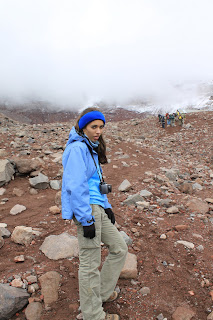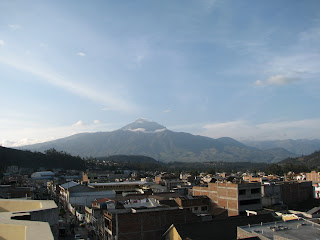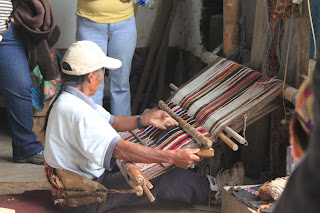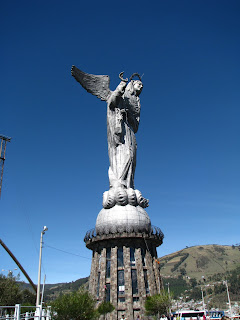December 6, 2009 Location: The road between Cuenca and Guayaquil, on the way to Montanita
Weather: Clear, hot, sunny, bound to get hotter as we near the coast
I hate this road. It's impossible to sleep on (as our 2AM trip to the Coast can attest) and it's nearly impossibly to write on. Hell, it's nearly impossible to remain at a 90 degree angle. The twists and turns and bumps and sudden stops and the truck currently hurtling toward us head on insure that I'm awake and at the very peak of anxiety. Fortunately, we'll be at the beach in three hours at the very most and there will be no stress whatsoever. Drs. Melampy and Martin, I know your papers are due on Friday. But... I'm going to remember the excitement of seeing one of Ecuador's most popular beaches more than sitting in my room all day typing, stressing, and studying. I think for the first time in my life, I am putting academics second. My GPA doesn't matter as much as the experience. I think that's been one of the most valuable lessons that this trip has taught me: to forget about a 4.0 and just enjoy being here. The things I'll regret most in twenty years are the things I didn't do—not the 4.0.
With five days left in Cuenca (and this hellish drive AGAIN at the end of that time), I am really getting nervous about leaving. My family is family here. They're more of my family than my those who never call and the thirty or so great-somethings I only see at family reunions. Mama Isa gets a kick out of being called “Mama” for the first time in her life—something I know she craves, just from the way she is magnetized to babies and children—and something her jerk of a husband never gave her the chance to become. Tio Manuel dotes on me and teases me and buys me my favorite white wine to go with our dinners and giant fabric hats shaped like mugs of Pilsener. Abuelito asks for me and buys me ice cream on Sundays. Abuelita suffering from Alzheimer's and blindness, is very endearing on her lucid days. “Erikita! Mi guagua!” She says, grinning from ear to ear when I kiss her good morning. Some days I sit on her bed and listen as she warns me of thieves and asks for the fifth time that day when I will be returning to Ecuador. Too soon, I always tell her. The other night, on one of her forgetful evenings, she asked to come dancing and drinking with me. She always blesses me before I leave the house. My maternal grandfather rarely says I love you when I say it to him and these people, with whom I've spent two and a half months, show and say loving things. I am going to miss them so incredibly much. I feel at home here, where I am white and speaking a different language, than I do in most places in the States.
As much as I love this country, I am not blind to its problems. The political issues are obvious, but my experience at the discotheque Velvet made me aware of just how corrupt it can be. Every country can be, everywhere has crime, every population has a percentage of people who should never have been born.
Velvet opened two months ago and is all the rage because of the novelty of a new club and the Plastics who go there. Word was that it was the place to go on Friday, so we went. We thought $6 was a bit steep, so when I struck up a conversation with a man outside who turned out to be the owner, I pushed up my chichis and told him how it was our last week in Ecuador and how we were only poor college students. He let us in for $5. He showed me a card with my name on it that was meant for Adam and I, on which was listed all the things we had to pay for: entrance fee, drinks, food, etc. At the end of the night, we were to pay before leaving. On the surface, the system looks a bit classier because there isn't a lot of cash floating around. It is, in truth, a way to make easy money. Lose the card? $250 fine. Rip it up? Hell to pay.
My feet were hurting and I wanted to get up early to do homework, so Adam and I went to pay. As I was adding up the bill at the counter, I couldn't believe what I saw. Three Coronas were true. One shot of Jose Cuervo was true. One pack of cigarettes was true. But three Cosmopolitans?
“No es verdad,” I told the worker in confusion, pointing at the marks on the paper. “Tuve solo uno.”
“No es mi problema,” he snapped.
I went down the list, explaining how it was all true except for the Cosmos. Talk to the bartenders, he told me. So I did. I found the bartender who had made me my single Cosmo and showed him the marks. “If I had three,” I told him, “I would be on the floor covered in vomit. You did not serve me three drinks.”
“No es mi problema,” he told me snootily.
Adam's drunken rage didn't help. He told the bartender we wouldn't be paying for something we didn't buy and ripped the card up into four pieces. That's when the bouncer showed up with the owner. I shoved Adam out of the way before a fight broke out and went to explain the situation.
“Who ripped up the card?” He demanded in English.
I told him it wasn't important, but he asked repeatedly. I explained the situation, I showed him the marks on the card, I told him as calmly as I could that three Cosmos would mean a passed out gringa on his club floor.
“Maybe your boyfriend drank them. It's not my problem,” he said, leading me to pay. Of course. Because my ex-marine friend really enjoys drinking sugary, pink, girly drinks. The owner didn't think that was so ridiculous. On the way there, I resigned myself to paying $15 in Cosmos instead of $5, and handed him two $10 bills. He handed them and the card to the cashier.
“Your bill comes to $40,” he told me, hand out. I gave him a twenty and went to leave when he stopped me. “$40—not $20.”
I stared at him. “I gave you $20 before in tens and I just gave you another $20. I paid you.”
“You're crazy. You never gave me any money before this. Did I hand him any money? No. See? You owe me $20 more. Just because you're American doesn't mean you can leave without paying. You come here and you don't respect me because I'm from Ecuador and you're from America.”
I think that's when my tears stopped and the hyperventilating started. The cops were going to be called. The owner thought Americans were crooked and rich and had no respect for the people and country I'd grown to love. I don't remember much besides seeing Lizzie in between the black spots in my vision and hearing her and Megan's mom, Diana, trying to calm me down over the roaring in my ears. After what seemed like an entire night, the owner, freaked out beyond belief, told me he'd forgive me the $20 and let Adam go.
“He has to go,” he said smoothly, “but you can stay if you want. I want you to stay.”
I stared at his fat, bald head blankly. This was the same man who had tried to dance with me and I had denied him because I had a boyfriend. It made a lot more sense, all of a sudden. I was still shaking and unable to breathe from the panic attack, but I managed to give him the most scathing look I've been known to posses and tell him that I would never want to stay and that I would spread the word about what happened to all the other gringoes club owners want so much to have in their clubs.
It wasn't until the next day that I found out that almost every single person in our group (20 people all together) had been overcharged, whether they were Ecuadoreans or gringoes. My cousin Leslie told us later that the club has already acquired the dubious honor of being known for screwing people over. A journalist we met at Amauta and later at Zo said he would write a scathing review of the club in the magazine he published for gringoes in Ecuador. Whether he will or not, I don't know, but I made no bones about spreading the word to everyone we met.
I told Adrian, the owner of Zo, about it last night and he said the same thing. It was not the first time he'd heard of something like that happening at Velvet. Adrien runs a good club. It may not be white and swanky and packed with Plastics, but he is honest and fair and gives me free drinks instead of charging me for extras. He pats my cheek and kisses it like I'm a naïve little girl but respects me, still treating me with as much fairness as he ever did.
“I'll miss you,” he told me when I hugged him goodbye. “Come back to my club the day you return to Ecuador.”
So guess who's getting a good online review at all the travel websites?
December 8, 2009
Loction: On the road back from Montanita
Weather: Crummy, cold, rainy
This is what we expected from Montanita:

This is what we got at Montanita:

Making the best of it with my lovely ladies:

Ashley was NOT pleased to have things with eyes in her soup

Antonia didn't mind

Pilsener <3

How many men does it take to change a tire? Four. Three to give advice and watch and one to actually change it.

Our happy bunch:

You know Murphy's Law? It says that everything that can and will go wrong at the worst possible time will indeed go wrong. That's what happened with the side trip that we planned for our last free weekend in Ecuador.
We had some extra money to spend on the trip so Dr. Martin, Dr. Melampy, Adam, Lauren, Sara, Ashley, Antonia, and I decided to go to the coast to spend a few days relaxing before the paper writing frenzy began. What could be better? The sun, the surf, relaxation, a few Pilseners, a nice tan to make everyone jealous when we return bronzed in the middle of December...
That SO didn't happen... None of it.
We should have turned around and gone back when our taxi busted a tire only a half hour outside Cuenca. We all got out to walk around in the sun while the three men looked on and offered suggestions to the taxi driver about the proper way to change a tire. How many men does it take to change a tire? Four, apparently. The girls just stood back and laughed.
I got some reading done for Martin's final paper on
The House of the Spirits. It now looks like a very well-loved book. The pages have gotten damp and dog-eared, passages have been underlined and starred, and the spine is creased in multiple places. Generally, I take very good care of my books to the point of making them look like they've never been opened. But this book is incredible and looks like I've spent as much time with it as I have.
We got to the coast and it immediately began raining. It rains often in Ecuador, especially in the morning or early afternoon. Then it generally clears up and it's beautiful and sunny in the evening. No big deal, we thought, we'll wait until it passes.
It never did. Not Saturday, not Sunday. It poured.
The hostel was pretty cool looking, with a hot tub, a pool, and a big cabin overlooking the beach a couple miles away. The hostel owner was an ex-hippie who rambled on about his spiritual journey. "Knowledge is 'no ledge,' man!" He told us. He praised iowaska, or ayahuasca which means "spirit vine" in Quechua, one of the most powerful hallucinogenic drugs known to mankind. It's often used by shamans in rituals where some say that the visions will heal you from any "demons" you may have. He even had some on hand. No, thank you. That's what Zoloft is for.
[Later:
Here's an interesting National Geographic article I found on it. Click on the blue, underlined letters to read it.]
The next day, Adam, Antonia, Ashley, and I decided to hike down to the beach and hope the sun cleared up the clouds. We slid down the muddy hillside, trying to avoid cow patties and getting our shoes soaked and muddied beyond all belief, and walked in the rain several miles until we got to the beach. We ate a crab and seafood chowder lunch with some massive bottles of Pilsener to make the day a little bit better. We were wet, freezing, and displeased that it was still raining and misting heavily. Sometimes life is just so ridiculous you have to laugh at yourself.
We made it into the town of Montanita, famous for its surfing community and its young, hippie crowd. Indeed, it lived up to its standards.
At that point, we were so worn out, we got a taxi back to the hostel and soaked in the hot tub for the rest of the evening. Then, we found an unexpected visitor: Sir Palmetto Bug and his merry band of roaches. Ashley dueled Sir Palmetto Bug but he skittered away to fight another day.
Gross. I don't think I've ever been so happy to leave a place.
Pros:
-ocean view room
-$15 out of pocket for the whole trip
-the beach
-the hot tub
-$2 crab lunch
-a small, intimate group
-finding the 200th bird for the Bio list
Cons:
-a hotel owner whose brain cells have obviously been burned away bit by bit (“Knowledge is having 'no ledge,' get it? Ha ha!”)
-rain
-muddy feet from sliding down the path to the beach
-battles with Sir Palmetto Bug and his Merry Band of Buggies who inhabited our rooms
-getting screwed over by a street artisan who tricked us (and by "us" I mean "Adam") into buying nothing
I think I'm ready to go home now.












































